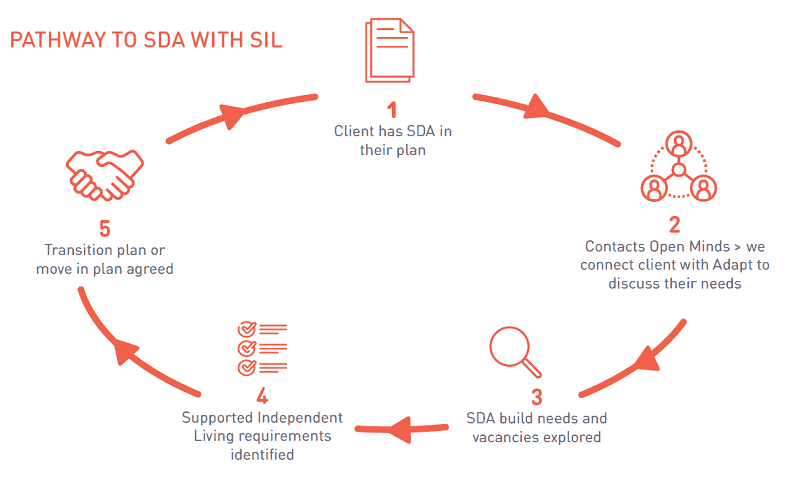Open Minds has partnered with Adapt Housing to offer clients a range of Specialist Disability Accommodation (SDA) housing with Supported Independent Living (SIL). Here’s a run-down of what SDA and SIL mean, and the pathway to get funding for that dream-home!
This sector loves abbreviations, acronyms and jargon. Let us break it down for you.
Participants who are eligible for SDA Housing under the National Disability Insurance Scheme (NDIS) are funded to live in accommodation that has been tailored to their physical needs.
Supported Independent Living is the type of funding provided by the NDIS to someone who has been assessed as needing support with daily tasks to live in their own home 24/7.
Whilst support to live independently has been around in some shape or form for many years, the concept of purpose built homes funded under the NDIS has not.
And the best part?
Property Developers have jumped at the opportunity to provide sustainable, long term solutions.
The next best thing?
They are building homes, not just houses. Lifestyles, not just living. They know what people want from a home and through extensive consultation they are building homes that are literally changing people’s lives.
Some of the many types of accommodation for people who need it most, just haven’t existed outside of a clinical or specific setting such as aged care or disability facilities where physical aids and requirements such as wide doorways and ramps are visible from the moment you arrive – playing on your psyche of ‘oh I know where I am’.
We are fortunate to live in an era where products, technology and design have far surpassed the now common, automatic sliding door.
This new era of Disability accommodation has brought socially responsible companies, investors and developers together to provide homes which are purpose built with features that would have the average home owner drooling.
They are big, spacious, accessible, technically geared homes that are modest about their presence.
Seamless entries between patios and living spaces so wheelchairs don’t get stuck, benches which lift and lower, walls that are reinforced to prevent damage, showers and bathrooms that accommodate two people where support is required, automated lighting and doors…..do we need to continue?

Here we explain how the NDIS have categorised the five types of SDA housing: Basic, Improved Liveability, Fully Accessible, High Physical Support and Robust Construction.
BASIC
Homes which were occupied before NDIS came into effect, which people are happy to continue living in (no new features).
- No special design features
- Must have outdoor areas
- Privacy, location, and sharing of supports is factored in
IMPROVED LIVEABILITY
Through our partnership with Adapt Housing, Open Minds built a specialist Improved Liveability home in Loganholme.
- For those with sensory, intellectual or cognitive impairments
- Built for a reasonable level of physical access
- Reduced stimuli for those who need it
FULLY ACCESSIBLE
Adapt Housing have recently completed a Fully Accessible home in Burpengary.
- High level of physical access
- Bathroom fittings and kitchen appliances accessible from both seated or standing positions
- Doors and outdoor areas wheelchair accessible
HIGH PHYSICAL SUPPORT
For those with significant physical needs
- Wheelchair accessible
- Provision for ceiling hoists
- Appliances and bathroom fixtures accessible from both seated and standing positions
- Provision for assistive technology
ROBUST
Open Minds are pleased to welcome residents to our newly completed home in Bridgeman Downs. Another beautiful, purpose built home by Adapt Housing.
- Sound proofing materials
- Resilient but modest materials and features to reduce maintenance
- Built to keep occupants and others safe

